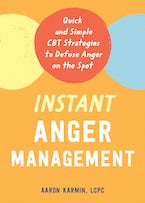By Aaron Karmin, LCPC, author of Instant Anger Management
When we do not understand how to effectively deal with anger, we often choose coping methods that are harmful.
Here are some unhealthy ways of coping with anger:
- Putting anger down. We deny anger or repress it. Some of us like to keep our “nice person” image and not make waves. Perhaps we say to ourselves that the situation is not important, and we swallow our anger.
- Putting anger off. We think we can put the situation off, not get angry, and deal with it later.
- Transferring anger. We are nice to people who make us angry, but we are hateful to those who love us. For example, a man’s boss criticizes him at work, but the man takes his anger out on his child instead of expressing his anger to his boss. Or a man whose first wife cheated on him feels a rush of jealous anger toward his new wife when she says, “I might be late getting home tonight.”
- Deadening feelings. People who can’t cope with their anger and are afraid to express it often choose not to feel any emotions at all. Their reasoning is that if they don’t feel anything, then they can’t be hurt. This is a very dangerous method because it puts them out of touch with their emotional reality.
- Staying in control. Some people think that they must always be in control of a situation. They see anger as weakness and unthinkable loss of control.
Next time you are feeling a surge of anger, try one of these healthy coping techniques:
Take care of yourself. Get enough rest and eat regularly. If you are irritable or tense from lack of sleep or if you are not eating correctly, you will have less ability to deal with a stressful situation.
Make as many daily decisions as possible. This will give you a feeling of control over your life.
Know your limits. If the problem is beyond your control and cannot be changed, don’t fight the situation. Reach out to others for support and collaboration.
Practice relaxation and meditation. Create a quiet scene. You can’t always run away, but you can hold a vision in your mind—a quiet scene or walking along the beach can temporarily take you out of the turmoil of a stressful situation.
Take one thing at a time. For people under stress, an ordinary workload can sometimes seem unbearable. The load looks so great that it becomes painful to tackle any part of it. When this happens, remember that it is a temporary condition and that you can work your way out of it—one step at a time.
Allow time for a task. This will help reduce some of your self-imposed time pressure. If you normally plan half an hour to get a job done by rushing through it, schedule forty-five minutes or an hour so you can do the job more deliberately and thoughtfully. This can only improve your quality of work. Give your best effort, but don’t take yourself to task if you can’t achieve the impossible.
To learn more about anger, check out Instant Anger Management. This book is based on proven-effective cognitive behavioral therapy (CBT). Packed with quick and simple techniques—such as breathing, acceptance, and self-expression—this book will help you stay grounded, identify your triggers, and balance your emotions. You’ll also find tips and strategies to curb negative or self-critical thoughts, make self-care a priority, and maintain a more positive outlook on life!
Aaron Karmin, LCPC, is a licensed clinical professional counselor who earned his master’s degree through Roosevelt University in Chicago, IL. In addition, Karmin is a certified clinical hypnotherapist, and holds an advanced certification in stress management. He is author of Anger Management Workbook for Men, and his approach focuses on identifying physical cues, recognizing thoughts, considering consequences, implementing solutions, choosing behaviors, and promoting expression.



 2024 Peace Playbook: 3 Tactics to Avoid Clashes with Your Partner
2024 Peace Playbook: 3 Tactics to Avoid Clashes with Your Partner